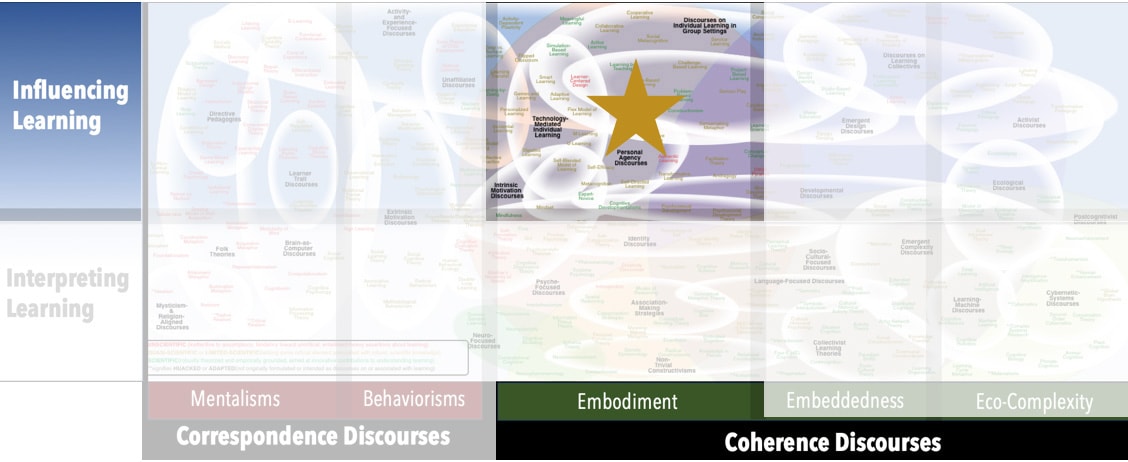AKA
Prochaska's Transtheoretical Model of Change
Transtheoretical Model
Focus
Stages learners pass through in deliberate efforts to change habitsPrincipal Metaphors
There is a tremendous variety of interpretation of Stages of Change Theory, with some versions framing learning as “behavior change” and others as “conceptual change.” The associated metaphors for knowledge, teaching, etc. vary correspondingly. The following thus fit must, but not all variations.- Knowledge is … scope of possible action and interpretation
- Knowing is … current competencies
- Learner is … changing agent
- Learning is … change
- Teaching is … managing change
Originated
1970sSynopsis
Stages of Change Theory parses learning into a sequence of five stages, each associated with specific strategies to promote movement to the next stage while preventing regression to previous stages. Originally based on studies of people who were trying to stop smoking, it has since been applied to a broad range of skills and concepts. The stages in the 1992 version were:- Precontemplation Stage (J.O. Prochaska, C.C. DiClemente, 1970s) – the first phase in the Stages of Change model, during which one is not intending to take action in the foreseeable future, typically because one is unaware of or underplaying the negative consequences of the target activity.
- Contemplation Stage (J.O. Prochaska, C.C. DiClemente, 1970s) – the second phase in the Stages of Change model, during which one assesses the pros and cons of changing the target behavior – although not necessarily with the intention to change
- Preparation Stage (Determination Stage) (J.O. Prochaska, C.C. DiClemente, 1970s) – the third phase in the Stages of Change model, during which one makes plans to change the target behavior with an intention for imminent action
- Action Stage (J.O. Prochaska, C.C. DiClemente, 1970s) – the fourth phase in the Stages of Change model, during which one has changed the target behavior and is working on maintaining that change, typically by developing alternative heathier behaviors
- Maintenance Stage (J.O. Prochaska, C.C. DiClemente, 1970s) – the fifth phase in the Stages of Change model, during which one maintains change for an extended period and is taking steps to avoid regression
- Termination Stage (various, 1990s) – a sixth proposed phase to elaborate the Stages of Change model, marked by the absence of desires to engage in the problematic behavior. Rarely achieved, the Termination Stage is manifest as a confidence there will be no regression.
Commentary
The alternative title of Stages of Change Theory (i.e., Transtheoretical Model) gives an immediate hint at a likely issue. A model that attempts to reach across a broad range of theories must do so in ignorance of their particular interpretations of the complex dynamics of learning. In the process, there is a risk of regressing to the most commonsensical and familiar notions. Thus, while the model might be useful and appropriate for applications related to its original inspiration (i.e., stopping smoking), it may not be wise to extend it to other contexts and contents of learning without some critical interrogation of its narrow intentions and associated baggage.Authors and/or Prominent Influences
J.O. Prochaska; C.C. DiClementeStatus as a Theory of Learning
Stages of Change Theory is most often presented as a theory of learning. However, it is not in any way concerned with affording new or nuanced understandings of the complex dynamics of learning. Rather, it is a model of stages that might be plotted out to influence learning.Status as a Theory of Teaching
Stages of Change Theory is principally a theory of teaching. It is a framework for managing and tracking learning.Status as a Scientific Theory
Within contexts associated with its original development (i.e., stopping smoking), evidence has been gathered to demonstrate the efficacy of Stages of Change Theory. However, as a more generalized model, it does not fulfill our criteria for a scientific theory, principally because proponents are typically inattentive to underlying metaphors and conceptual commitments. Consequently, often broad and incompatible ranges of metaphors are invoked across interpretations.Subdiscourses:
- Action Stage
- Contemplation Stage
- Maintenance Stage
- Precontemplation Stage
- Preparation Stage (Determination Stage)
- Termination Stage
Map Location

Please cite this article as:
Davis, B., & Francis, K. (2024). “Stages of Change Theory” in Discourses on Learning in Education. https://learningdiscourses.com.
⇦ Back to Map
⇦ Back to List
